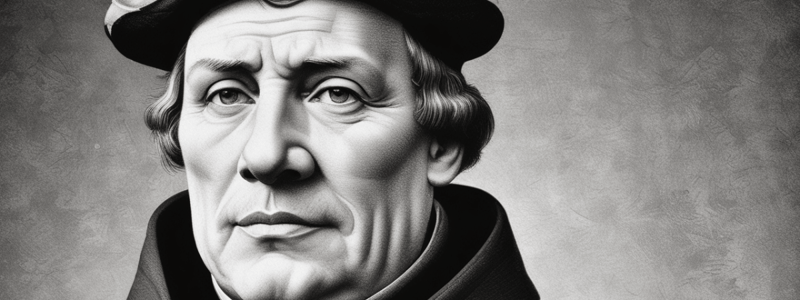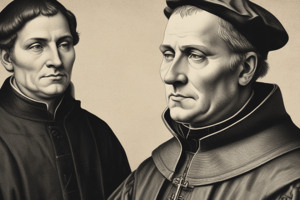Podcast
Questions and Answers
According to Luther, good works are the foundation of a Christian life.
According to Luther, good works are the foundation of a Christian life.
False (B)
Luther believed that pilgrimage was a means of justification.
Luther believed that pilgrimage was a means of justification.
False (B)
For Luther, the gospel of Christ is the most holy word of God.
For Luther, the gospel of Christ is the most holy word of God.
True (A)
Luther believed that faith and works are equally necessary for Christian life.
Luther believed that faith and works are equally necessary for Christian life.
The proclamation of the Word and the grasping of that Word by faith is the end of the Christian life for Luther.
The proclamation of the Word and the grasping of that Word by faith is the end of the Christian life for Luther.
Luther's understanding of the Christian life was shaped by high literacy rates in his era.
Luther's understanding of the Christian life was shaped by high literacy rates in his era.
For Luther, the Christian life is primarily an individual concern.
For Luther, the Christian life is primarily an individual concern.
Martin Luther's open letter to Leo X was not a genuine attempt to reconcile with the pope.
Martin Luther's open letter to Leo X was not a genuine attempt to reconcile with the pope.
Luther believed that the Word of God is only accessible to those who can read.
Luther believed that the Word of God is only accessible to those who can read.
Luther's 95 Theses were nailed to the Castle Church in 1520.
Luther's 95 Theses were nailed to the Castle Church in 1520.
Luther's open letter to Leo X was written in 1517.
Luther's open letter to Leo X was written in 1517.
Luther's attacks on the papacy were also attacks on the person of the pope.
Luther's attacks on the papacy were also attacks on the person of the pope.
The language of liberty is a central theme in Luther's treatise.
The language of liberty is a central theme in Luther's treatise.
Luther's open letter to Leo X was his first attempt to reform the Christian faith.
Luther's open letter to Leo X was his first attempt to reform the Christian faith.
Luther's primary goal was to overthrow the papacy.
Luther's primary goal was to overthrow the papacy.
Luther's reforms were limited to Germany.
Luther's reforms were limited to Germany.
The Elector established a visitation to every parish to check the people's attendance to the gospel.
The Elector established a visitation to every parish to check the people's attendance to the gospel.
Luther's large catechism is a set of sermons catechetically arranged to provide ignorant ministers with something to read to their congregation.
Luther's large catechism is a set of sermons catechetically arranged to provide ignorant ministers with something to read to their congregation.
Luther's small catechism only explains the basics of the Christian faith and does not expound the Ten Commandments.
Luther's small catechism only explains the basics of the Christian faith and does not expound the Ten Commandments.
The third use of the law started to come into Lutheranism from the early 1520s.
The third use of the law started to come into Lutheranism from the early 1520s.
Luther believed that the law was not vital for Christian life.
Luther believed that the law was not vital for Christian life.
Luther's theology suggests that sin doesn't really matter because Jesus has done it all for you.
Luther's theology suggests that sin doesn't really matter because Jesus has done it all for you.
Luther wrote the 95 Theses in 1527.
Luther wrote the 95 Theses in 1527.
Luther's catechisms were meant to provide a simple law-gospel dialectic.
Luther's catechisms were meant to provide a simple law-gospel dialectic.
Martin Luther's three great treaties of 1520 only include the Babylonian Captivity of the Church and the Freedom of the Christian Man.
Martin Luther's three great treaties of 1520 only include the Babylonian Captivity of the Church and the Freedom of the Christian Man.
Martin Luther's eschatological expectation of Jesus' return remained unchanged throughout the Reformation.
Martin Luther's eschatological expectation of Jesus' return remained unchanged throughout the Reformation.
The three great treaties of 1520 provide a comprehensive manifesto for Luther's vision of the Reformation.
The three great treaties of 1520 provide a comprehensive manifesto for Luther's vision of the Reformation.
Luther's thinking on justification and ethics remained largely unchanged throughout his life.
Luther's thinking on justification and ethics remained largely unchanged throughout his life.
The three great treaties of 1520 are available for free online.
The three great treaties of 1520 are available for free online.
Ethics is a peripheral concern in Christian theology.
Ethics is a peripheral concern in Christian theology.
The Appeal to the German Nobility was written after Luther's death.
The Appeal to the German Nobility was written after Luther's death.
Luther's works are only available in expensive compendia.
Luther's works are only available in expensive compendia.
Martin Luther wrote treaties to create a new theological system, detached from the lives of ordinary people.
Martin Luther wrote treaties to create a new theological system, detached from the lives of ordinary people.
The fall of the Berlin Wall in 1989 is a perfect analogy for the reformation.
The fall of the Berlin Wall in 1989 is a perfect analogy for the reformation.
Luther's main goal was to quickly replace all Catholic priests with new Lutheran pastors.
Luther's main goal was to quickly replace all Catholic priests with new Lutheran pastors.
Luther's treaties were written primarily for the masses, to inspire them to action.
Luther's treaties were written primarily for the masses, to inspire them to action.
The reformation was a swift and total transformation of the Catholic Church.
The reformation was a swift and total transformation of the Catholic Church.
Luther's focus was on the individual, and their personal relationship with God.
Luther's focus was on the individual, and their personal relationship with God.
The Reformation was primarily a German phenomenon, with little impact on the rest of Europe.
The Reformation was primarily a German phenomenon, with little impact on the rest of Europe.
Luther's 95 Theses were a call to reform the Catholic Church from within.
Luther's 95 Theses were a call to reform the Catholic Church from within.
Calvin believed that the civil magistrate should interfere in the discipline of the church.
Calvin believed that the civil magistrate should interfere in the discipline of the church.
The Reformers were principled and spotless figures of legend.
The Reformers were principled and spotless figures of legend.
Luther called for a partial overhaul of the Christian faith.
Luther called for a partial overhaul of the Christian faith.
The Reformers were inflexible and unwilling to compromise their ideals.
The Reformers were inflexible and unwilling to compromise their ideals.
The Christian life, according to Luther, is primarily an individual concern.
The Christian life, according to Luther, is primarily an individual concern.
Luther believed that faith and works are equally necessary for Christian life.
Luther believed that faith and works are equally necessary for Christian life.
The Reformers were unwilling to break their own rules to achieve their goals.
The Reformers were unwilling to break their own rules to achieve their goals.
John Knox was one of the Reformers who tended to be inflexible and unwilling to compromise.
John Knox was one of the Reformers who tended to be inflexible and unwilling to compromise.
According to Luther, faith is what comes between Christ's grace and the soul's sin.
According to Luther, faith is what comes between Christ's grace and the soul's sin.
Luther believed that Christ only takes the good qualities of the soul, not the bad ones.
Luther believed that Christ only takes the good qualities of the soul, not the bad ones.
Luther's analogy of Christ as a bridegroom is based on the concept of forensic justification.
Luther's analogy of Christ as a bridegroom is based on the concept of forensic justification.
Luther's understanding of justification by faith is similar to modern evangelical individualism.
Luther's understanding of justification by faith is similar to modern evangelical individualism.
In Luther's analogy, the soul is full of grace, life, and salvation.
In Luther's analogy, the soul is full of grace, life, and salvation.
Luther's concept of justification by faith is not clearly presented in his early writings.
Luther's concept of justification by faith is not clearly presented in his early writings.
Luther believed that the Christian life is primarily about individual faith and works.
Luther believed that the Christian life is primarily about individual faith and works.
Luther's thinking is more focused on individual spiritual growth than on church reform.
Luther's thinking is more focused on individual spiritual growth than on church reform.
For Luther, preaching is simply explaining the Bible
For Luther, preaching is simply explaining the Bible
Faith is the only means of grasping Christ's salvation
Faith is the only means of grasping Christ's salvation
Luther believed that the soul is full of grace, life, and salvation
Luther believed that the soul is full of grace, life, and salvation
Luther's understanding of the Christian life was shaped by the idea of the bride and bridegroom
Luther's understanding of the Christian life was shaped by the idea of the bride and bridegroom
The Freedom of the Christian manual is a comprehensive guide to Luther's theology
The Freedom of the Christian manual is a comprehensive guide to Luther's theology
Luther believed that preaching is primarily about feeding the soul and making it righteous
Luther believed that preaching is primarily about feeding the soul and making it righteous
For Luther, the gospel of Christ is only accessible to those who can read
For Luther, the gospel of Christ is only accessible to those who can read
Luther's theology emphasizes the importance of the preached word in the Christian life
Luther's theology emphasizes the importance of the preached word in the Christian life
For Luther, the power of Christians is physical and violent.
For Luther, the power of Christians is physical and violent.
The rule of the Christian is synonymous with worldly authority.
The rule of the Christian is synonymous with worldly authority.
Luther believed that death is the ultimate enemy of the Christian.
Luther believed that death is the ultimate enemy of the Christian.
Luther's theology emphasizes the importance of faith and works equally.
Luther's theology emphasizes the importance of faith and works equally.
The freedom of the Christian man is the ability to do good works.
The freedom of the Christian man is the ability to do good works.
Luther believed that Christians are only priests, but not kings.
Luther believed that Christians are only priests, but not kings.
Luther's theology is centered on the idea that salvation is achieved through human effort.
Luther's theology is centered on the idea that salvation is achieved through human effort.
Luther believed that the Christian life is primarily a life of oppression and suffering.
Luther believed that the Christian life is primarily a life of oppression and suffering.
Martin Luther believed that the foundation of medieval Catholic ethics was based on a sense of certainty.
Martin Luther believed that the foundation of medieval Catholic ethics was based on a sense of certainty.
Luther's theology suggests that the Christian's works are to be done out of love for their neighbor.
Luther's theology suggests that the Christian's works are to be done out of love for their neighbor.
Luther believed that people will naturally draw an imperative out of the indicative of Christ.
Luther believed that people will naturally draw an imperative out of the indicative of Christ.
The 95 Theses were a call to reform the Catholic Church from outside.
The 95 Theses were a call to reform the Catholic Church from outside.
Luther's understanding of Christian ethics was shaped by the idea that the gospel of Christ is the most holy word of God.
Luther's understanding of Christian ethics was shaped by the idea that the gospel of Christ is the most holy word of God.
Luther's primary goal was to overthrow the papacy and establish a new theological system.
Luther's primary goal was to overthrow the papacy and establish a new theological system.
The Christian life, according to Luther, is primarily a collective concern.
The Christian life, according to Luther, is primarily a collective concern.
Luther believed that the proclamation of the Word and the grasping of that Word by faith is the end of the Christian life.
Luther believed that the proclamation of the Word and the grasping of that Word by faith is the end of the Christian life.
Flashcards are hidden until you start studying
Study Notes
Luther's Letter to Pope Leo X
- In 1520, Luther wrote an open letter to Pope Leo X, which is often seen as his last attempt to win the Pope over to his side.
- Despite its polite tone, Luther made a distinction between the person of the Pope and the authority of the papacy.
The Freedom of a Christian Man
- Luther's treatise "The Freedom of a Christian Man" is a key work that showcases his emphasis on the language of liberty.
- Although Luther's approach may seem disingenuous, he was genuinely trying to make a last-ditch effort to bring the opposing sides together.
Luther's Understanding of the Christian Life
- For Luther, the foundation of the Christian life is the Word of God, the Word of God preached.
- Faith alone is the saving and efficacious use of the Word of God, which is necessary for Christian life, righteousness, and freedom.
- Luther believed that the Christian life begins with the proclamation of the Word and the grasping of that Word by faith.
The Importance of the Word of God
- In Luther's era, most Christians could not read and access to the Word of God was limited to hearing it in church.
- Luther recognized the importance of the Word of God being preached and read in church, which is why he emphasized the role of the preacher.
Criticism of Luther
- Luther has been criticized for being radically individualistic in his understanding of Christianity, but this criticism overlooks the corporate context of the Christian life.
- Luther's emphasis on the Word of God and faith alone is not a rejection of the community, but rather an emphasis on the primary source of Christian life.
Luther's Treatises of 1520
- "The Babylonian Captivity of the Church", "The Freedom of a Christian Man", and "The Appeal to the German Nobility" are three treatises that represent a comprehensive manifesto for Luther's vision of the Reformation.
- These treatises provide a solid introduction to Luther's thinking on the sacraments, justification, ethics, and church-state issues.
The Impact of the Reformation
- The Reformation was not a sudden, wholesale transformation, but rather a gradual process that required the education and training of new pastors and the transformation of existing Catholic priests.
- Luther's writings were not intended for a mass audience, but rather for the priests and priests-to-be who needed to understand the new theology and implement it in their parishes.
Faith and Salvation
- Faith allows us to grasp Christ, and his cleanness flows into us, while our dirtiness flows into him and is dealt with.
- Christ is full of grace, life, and salvation, while the soul is full of sins, death, and damnation.
- When faith comes between them, sins, death, and damnation become Christ's, and grace, life, and salvation become the soul's.
Luther's Theology
- Luther's writing emphasizes the need for a total overhaul of the Christian faith and its ethics.
- He believes that Christians, united to Christ, are not only priests but also kings, and therefore rule as Christ rules.
- The rule of the Christian is cross-shaped, and Luther says that the power of Christians is spiritual, ruling in the midst of enemies and oppression.
The Power of Faith
- Luther quotes that "power is made perfect in weakness" and that in all things, one can find profit towards salvation, even the cross and death.
- The cross and death are compelled to serve and work together for salvation, making faith a truly omnipotent power.
- Faith alone survives for salvation, and nothing except faith is needed to exercise the power and dominion of its own liberty.
The Freedom of the Christian
- The freedom of the Christian is that nothing can prevent their salvation, and everything will be made to subserve their salvation, even death.
- Death for the Christian is the gateway to paradise.
- Luther thinks corporately, not individually, and sees Christians as part of the church, not isolated individuals.
Justification by Faith
- Luther's thinking emerges more clearly, playing off Paul's analogy of human marriage to the marriage between Christ and the Church.
- Justification by faith is not just a forensic concept, but it's also about the union with Christ and the exchange of our sins for his righteousness.
Lutheran Ethics
- Lutheran ethics find complications in the tension between affirming that Christians do works out of their identity in Christ and avoiding legalism.
- Luther emphasizes that Christian ethics should be shaped by love, rather than law or obligation.
- However, this approach assumes that people will draw an imperative out of the indicative of Christ and know how to shape that imperative in real life.
Studying That Suits You
Use AI to generate personalized quizzes and flashcards to suit your learning preferences.




